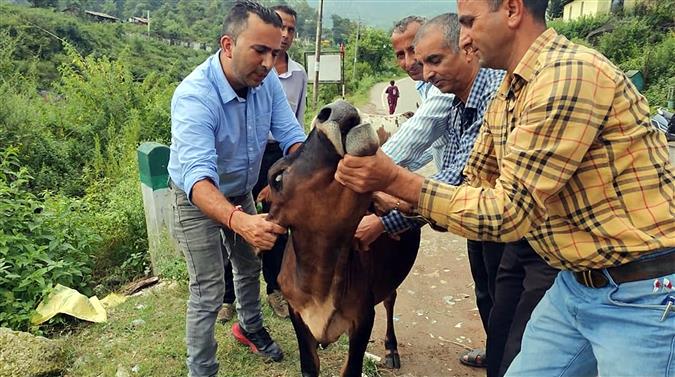
As per the data collected from the Animal Husbandry Department, 14,557 head of cattle, including cows and buffaloes, have been afflicted with the disease in Kangra and 439 cattle have died.
Vaccine procured
- 14,557head of cattle infected
- 13,000stray cattle in Kangra
- 439 head of cattle dead
- 17,000 doses of vaccine procured
Sources say that dairy farmers are facing an acute shortage of antibiotics, which are prescribed by veterinary doctors to treat the LSD. There are about four lakh head of cattle in Kangra, including about 13,000 stray cattle. However, till date, the Animal Husbandry Department has procured just 17,000 doses of the vaccine to treat the disease.
Sanjeev Dhiman, Deputy Director, Animal Husbandry Department, says that the demand for the vaccine and antibiotics prescribed for the treatment of the LSD has risen manifold across the country. As a result, there is a shortage of the vaccine even at private pharmacies in the district. “We have procured 17,000 doses of vaccine. Another 17,000 doses will be procured soon. We are administering vaccine to both stray and healthy cattle in the district to prevent the spread of disease. We are confident that within next fortnight, the spread of disease in cattle will be controlled,” he adds.
Deeraj Mahajan from NGO Kranti says that the Animal Husbandry Department has given them the task of vaccinating stray cattle. “We have started the drive to vaccinate stray cattle in the Dharamsala region. We shall be administering vaccine to about 5,000 stray cattle in the district,” he adds.
HPCC general secretary Kewal Singh Pathania says that dairy farmers are suffering huge losses due to death of their cattle. “A milk yielding cow costs between Rs 50,000 and Rs 1 lakh. Many dairy farmers in the Shahpur region have lost their livelihood after their cows died of the LSD. The government should compensate these farmers, who have lost their cattle due to the LSD,” he adds.
The sources say that stray cattle is a major problem in Kangra. “The number of stray cattle in the district is much more than the government estimates. Stray cattle can be spotted in every village of the district. These are generally the carriers of diseases even in remote areas of the district. Until adequate vaccines are supplied, it will be nearly impossible to control the disease,” they add.

















